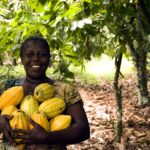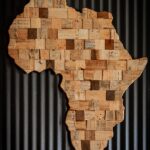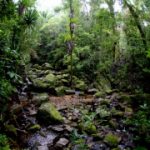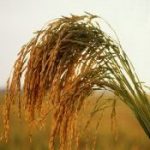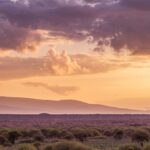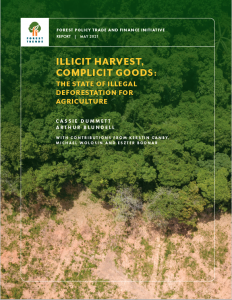
A team led by Tanzanian remote-sensing scientist Robert Masolele used high-resolution satellite data and deep-learning techniques to draw up a map identifying the drivers of forest conversion in Africa.
The research shows that most deforested land on the continent is turned into small-scale farms, with the Democratic Republic of Congo and Madagascar being hotspots for this pattern of forest loss.
With better remote-sensing data, researchers can pinpoint where agriculture is eating into forested areas and where cash crops are replacing woodland. In this work, the group focused on commodity crops like cacao, oil palm, rubber and coffee, which are targeted under the European Union’s recently enacted rules to restrict import of crops linked to deforestation.
This new article in Nature investigates the effect of a political crisis on the relative performance of community managed forests versus protected areas in terms of reducing deforestation in Madagascar. Annual rates of deforestation accelerated at the end of the crisis and were higher in community forests than in protected areas. After controlling for differences in location and other confounding variables, we find no difference in performance during the crisis, but community-managed forests performed worse in post-crisis years. These findings suggest that, as a political crisis subsides and deforestation pressures intensify, community-based conservation may be less resilient than state protection.
The first high-resolution (5 m) and continental-scale
mapping of land use following deforestation in Africa, including humid and dry forests.
Results show, not surprisingly, that the causes of forest loss vary by region. In general, small-scale cropland is the
dominant driver of forest loss in Africa, with hotspots in Madagascar and DRC. In addition, commodity
crops such as cacao, oil palm, and rubber are the dominant drivers of forest loss in the humid forests of
western and central Africa, forming an “arc of commodity crops” in that region. At the same time, the
hotspots for cashew are found to increasingly dominate in the dry forests of both western and southeastern Africa, while larger hotspots for large-scale croplands were found in Nigeria and Zambia.
In Madagascar, the August-to-December bushfire season wreaks havoc on the southwest and west of the island.
Dry Forest, a young Malagasy NGO, is attempting an extreme form of reforestation to save the forest in Kirindy Mite National Park.
In addition to the bushfires, the NGO faces many other challenges linked to local poverty.
Ashland is the unexpected home of the country’s only full-service forensic laboratory devoted to tracking illegally transported animals and plants. Now the lab is employing a new strategy to get forensic tools to U.S. ports to stop the illegal timber trade.
In November, a Kenyan court ordered the release of 646 metric tons of Malagasy rosewood (Dalbergia spp.), worth up to $13 million, to a Hong Kong-based company from which it had been seized in 2014 by Kenyan authorities.
Lawyers for the Kenya Wildlife Services (KWS), which filed a case against the consignment owners, argued that trade in rosewood was banned under CITES, the international wildlife trade convention; however, the judge in the case disagreed.
Rice, the main food crop of Madagascar, could be hastening the loss of biodiversity in the fourth-largest island of the world, according to two exhaustive studies published in the Science journal December 2, 2022.
The cultivation of rice on the island, especially using shifting agriculture, is causing deforestation and subsequent biodiversity loss, according to the research papers.
The papers also urged that collection and analysis of data on Madagascar’s remarkable biota must continue and accelerate “if we are is to safeguard this unique and highly threatened subset of Earth’s biodiversity”.
Madagascar, classified as a ‘Least Developed Country’ by the United Nations, has been in the throes of upheaval in the past few years.
Vohibola forest is one of the last primary forests standing in eastern Madagascar, and home to the world’s tiniest frogs and other rare and endangered creatures.
For a time, in the quiet imposed by COVID-19 pandemic lockdowns, Vohibola got a reprieve from some of the difficulties that have long plagued it, including deforestation, fires, and timber and charcoal trafficking.
The Zanzibar Declaration on Illegal Logging, signed on Wednesday at a global gathering on forests in South Africa, aims to improve communication between customs authorities and collaboration among forest officials from the east and southeast African nations.
Kenya loses around $10 million annually due to the illegal cross-border wood trade with Tanzania, while Tanzania loses more than $8 million, according to studies cited by the World Wildlife Fund (WWF), a green group backing the new agreement.
Click here to access the Global Illegal Logging and Associated Trade (ILAT) Risk assessment tool and to download the Forest Trends User Guide describing the functionality of the ILAT Risk Data Tool.
Click here to access the Cattle Data Tool.

